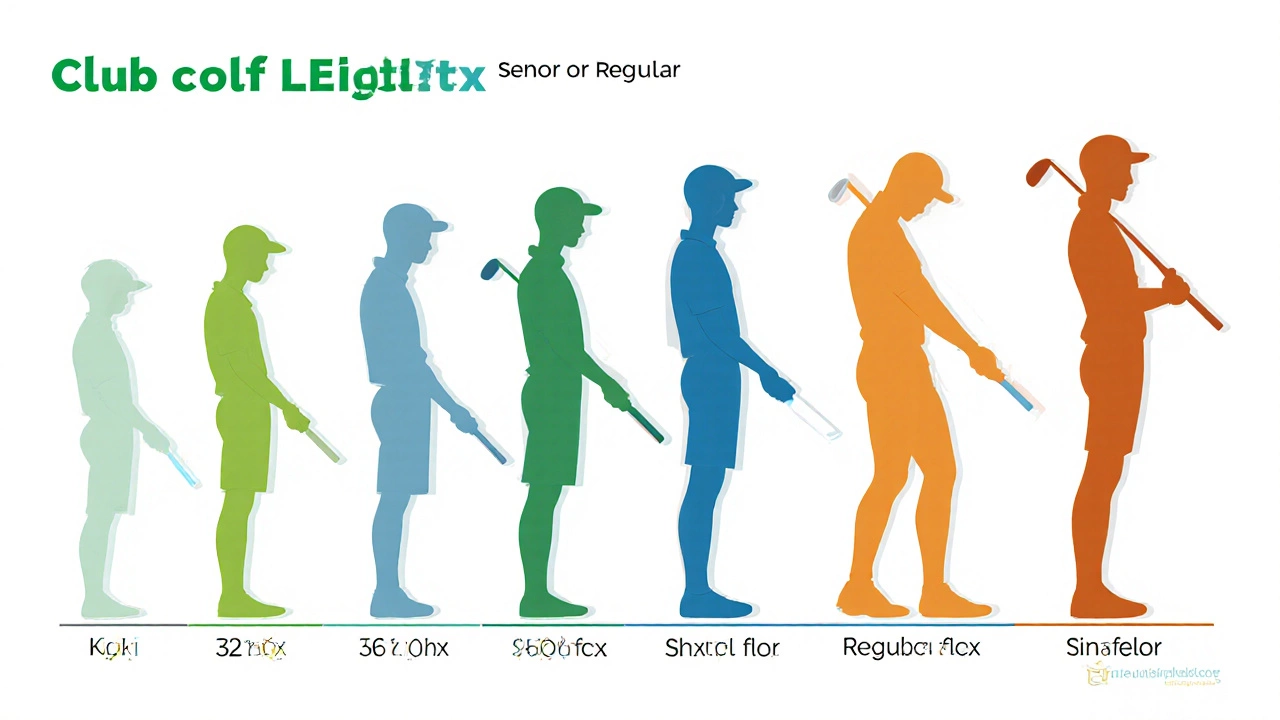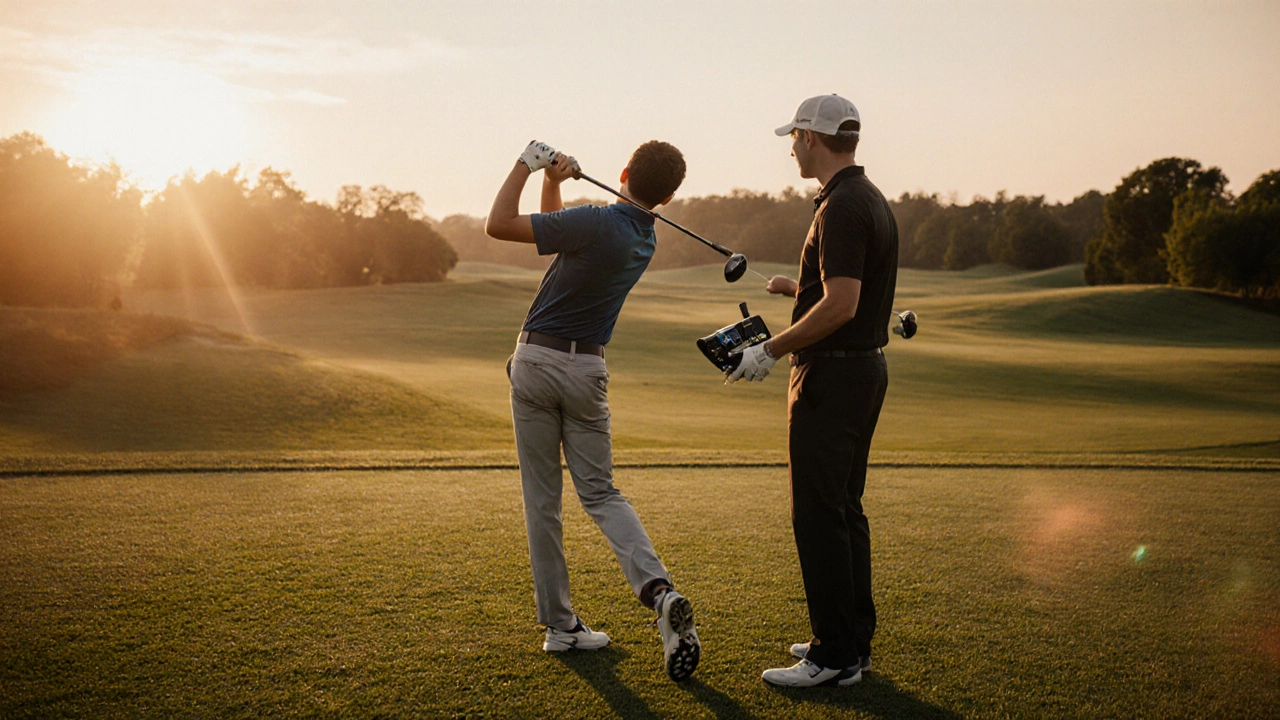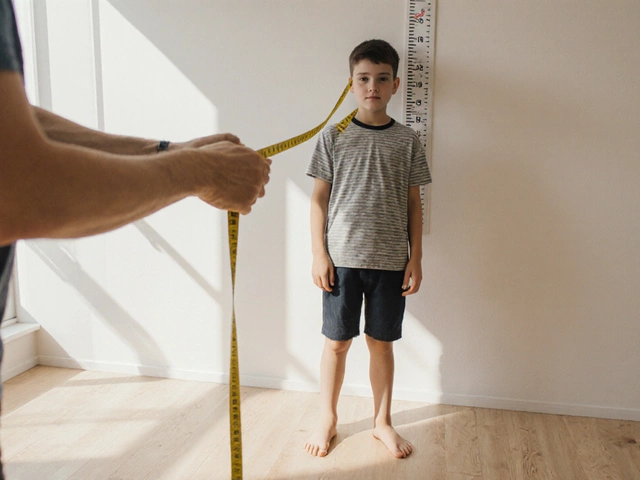Golf Club Size Calculator for 13-Year-Olds
Quick Summary
- Club length for a 13‑year‑old usually falls between 32" and 36" depending on height and wrist‑to‑floor measurement.
- Measure height and wrist‑to‑floor; use the chart to pick the nearest length.
- Choose a shaft flex that matches swing speed - typically regular or senior flex for most 13‑year‑olds.
- Head size should stay under 460cc to keep the club forgiving.
- Professional fitting is worth it once the teen’s growth spurt stabilizes.
Finding the right club size for a 13‑year‑old can feel like guessing. Kids at that age grow at different rates, and a club that's a few inches too long can ruin a swing before the teen even gets comfortable. This guide breaks down the exact measurements you need, shows a quick‑reference chart, and explains why each factor matters. By the end you’ll know exactly what size clubs to buy - no more endless trips to the pro shop.
Why a 13‑Year‑Old Isn't One‑Size‑Fits‑All
At thirteen most kids are in the middle of a growth spurt, but the timing varies wildly. Some are already 5'8" (173cm); others are still 5'2" (157cm). Junior golf clubs are clubs specifically designed for younger players, offering shorter shafts and lighter heads to match a smaller frame. The goal is to keep the club’s length proportional to the player's arm length so the swing plane stays natural.
Two key body measurements drive the decision: overall height and the wrist‑to‑floor measurement the distance from the wrist crease to the floor while the arm hangs relaxed. Height gives a broad range, while wrist‑to‑floor zeroes in on arm length, which directly affects how far the club should extend.
How to Take the Core Measurements
- Ask the teen to stand straight against a wall, shoes off.
- Use a flexible tape measure; record the total height in centimeters.
- Next, let the teen hang an arm naturally at the side, palm facing the body.
- Measure from the floor to the crease of the wrist (the spot where the hand meets the forearm). Record this number.
For most 13‑year‑olds, the wrist‑to‑floor measure falls between 25cm and 32cm. If the number is on the lower end, aim for a shorter shaft; on the higher end, a longer shaft is appropriate.

Recommended Club Length Ranges
| Height (cm) | Wrist‑to‑Floor (cm) | Suggested Club Length (inches) | Typical Shaft Flex |
|---|---|---|---|
| 150-155 | 25-27 | 32-33 | Senior |
| 156-160 | 27-29 | 33-34 | Senior / Regular |
| 161-165 | 29-31 | 34-35 | Regular |
| 166-170 | 31-32 | 35-36 | Regular |
| 171+ | 32+ | 36-38 | Regular or Stiff (if swing speed > 80mph) |
These numbers are a starting point. If the teen’s swing feels cramped, move up a half‑inch; if the club feels too long and forces the hands to lift, move down.
Choosing the Right Shaft Flex and Head Size
The shaft flex describes how much the shaft bends during the swing, influencing ball launch and control is tied to swing speed. Most 13‑year‑olds swing between 70‑85mph, which aligns with a senior or regular flex. If a teen is exceptionally fast (over 90mph) a regular or even stiff flex may be warranted.
Head size is another variable. Modern golf club heads come in a range of volumes measured in cubic centimeters (cc) for beginners typically stay under 460cc. This keeps the club forgiving while still offering enough weight for a solid impact.
When to Get a Professional Fitting
Even with measurements, a pro shop fitting can fine‑tune the club. A golf club fitting is a service where a trained fitter adjusts length, lie angle, shaft, and grip to match the player’s swing dynamics uses launch monitors to measure clubhead speed, launch angle, and face angle. If the teen has already played a season and is serious about improvement, a fitting can shave several strokes off the score.
Schedule a fitting when the teen’s height has stabilized for at least three months - this avoids re‑adjusting after a growth spurt.

Common Pitfalls and How to Avoid Them
- Buying by age alone. Age is a rough guide; measurement beats guesswork every time.
- Choosing the longest club possible. A longer club forces the teen to swing from the hips, leading to poor mechanics.
- Ignoring shaft flex. Too stiff a shaft feels heavy and reduces clubhead speed; too soft a shaft can cause early release.
- Skipping grip size. A grip that's too big makes the club feel unwieldy. Junior grips are usually 1‑2mm smaller than adult grips.
By keeping these points in mind, you’ll help the teen develop a repeatable swing rather than fighting the equipment.
Quick Checklist Before Buying
- Measure height and wrist‑to‑floor.
- Consult the club length chart and pick the nearest size.
- Select a shaft flex that matches swing speed (senior or regular for most).
- Choose a head under 460cc for forgiveness.
- Try the club in hand; the grip should feel snug but not tight.
- Consider a professional fitting once growth steadies.
Frequently Asked Questions
What club length should I buy for a 13‑year‑old who is 5'4" tall?
A teen at 5'4" (163cm) typically falls into the 34-35‑inch range. Check the wrist‑to‑floor measurement; if it’s closer to 31cm, aim for 35 inches, otherwise 34 inches works well.
Do I need to buy a full set of junior clubs or just a few?
Start with the driver, a 5‑iron, and a putter. Those three cover most on‑course situations. As the player progresses, add mid‑irons and a wedge to fill gaps.
How often should a growing teen re‑measure for club length?
Every 3-4months during a growth spurt, then once a year once growth slows. Re‑measuring prevents out‑grown clubs from hurting swing mechanics.
Is a regular flex shaft always the best for a 13‑year‑old?
Not always. If the teen’s swing speed is under 70mph, a senior flex offers easier launch. Faster swingers (80mph+) benefit from regular flex for better control.
Can I use adult clubs if they fit the length chart?
It’s possible, but adult clubs are heavier and have larger heads, which can slow swing speed and make short‑game shots harder. Junior‑specific clubs keep weight down and improve feel.






